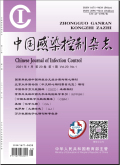中国感染控制杂志2024,Vol.23Issue(1):32-41,10.DOI:10.12138/j.issn.1671-9638.20244248
静脉注射维生素C对脓毒症与脓毒性休克患者预后的影响:随机对照试验的Meta分析
Effect of vitamin C intravenous injection on prognosis of patients with sep-sis or septic shock:A Meta-analysis of randomized controlled trial
摘要
Abstract
Objective To evaluate the efficacy of vitamin C intravenous injection in the treatment of patients with sepsis.Methods PubMed,Embase,Scopus,Cochrane Library,and Clinical Trial databases were retrieved,with a retrieval period from database establishment to December 2022.English literatures on randomized controlled trial(RCT)of vitamin C intravenous injection for the treatment of sepsis or septic shock were collected.Meta-analysis was conducted using RevMan 5.3 software and Stata 15.0 software after literature screening,extraction,and evalua-tion of the bias risk included in the studies by two researchers independently.Results A total of 16 RCT studies involving 3 301 patients were included in the analysis.In terms of main outcomes,the 28-day mortality of patients in the vitamin C treatment group was slightly lower than that of the control group,but the difference was not statis-tically significant(RR=0.86,95%CI[0.72-1.03],P=0.10;I2=44%,P=0.10).In terms of secondary out-comes,vitamin C intravenous injection can reduce the duration of vasoactive drug usage time(MD=-23.44,95%CI[-30.53--16.35],P<0.01;I2=0,P=0.97),but has no significant effect on the 90-day mortality,inten-sive care unit mortality,hospital mortality,duration of mechanical ventilation,difference in estimated sequential organ failure assessment score at 72 hour,length of stay in ICU,and total length of hospital stay of patients(P>0.05).Conclusion Intravenous vitamin C injection can significantly reduce vasoactive drug usage time,but the available evidence is insufficient to support that intravenous vitamin C can improve the prognosis of patients with sepsis or septic shock.More high-quality,multicenter randomized controlled trial is needed to provide more substantial evidence about the efficacy of vitamin C in treating sepsis or septic shock.关键词
脓毒症/脓毒性休克/病死率/维生素C/Meta分析Key words
sepsis/septic shock/mortality/vitamin C/Meta-analysis分类
医药卫生引用本文复制引用
赵国敏,边伟帅,甄洁,陈炜..静脉注射维生素C对脓毒症与脓毒性休克患者预后的影响:随机对照试验的Meta分析[J].中国感染控制杂志,2024,23(1):32-41,10.基金项目
国家重点研发计划项目(2020YFC2005403) (2020YFC2005403)
2022年度北京市重大疫情防治重点专科建设类项目(ZDYQFZZDZK) (ZDYQFZZDZK)
北京市属医院科研培育计划项目(PX2020031) (PX2020031)

